Russia-Ukraine war: Implications for China and the Indo-Pacific
As the fighting in Ukraine continues, Associate Professor Alexey Muraviev of Curtin University analyses President Vladimir Putin's likely next moves and the impact that the Ukraine war will have on the Indo-Pacific and China's calculations.
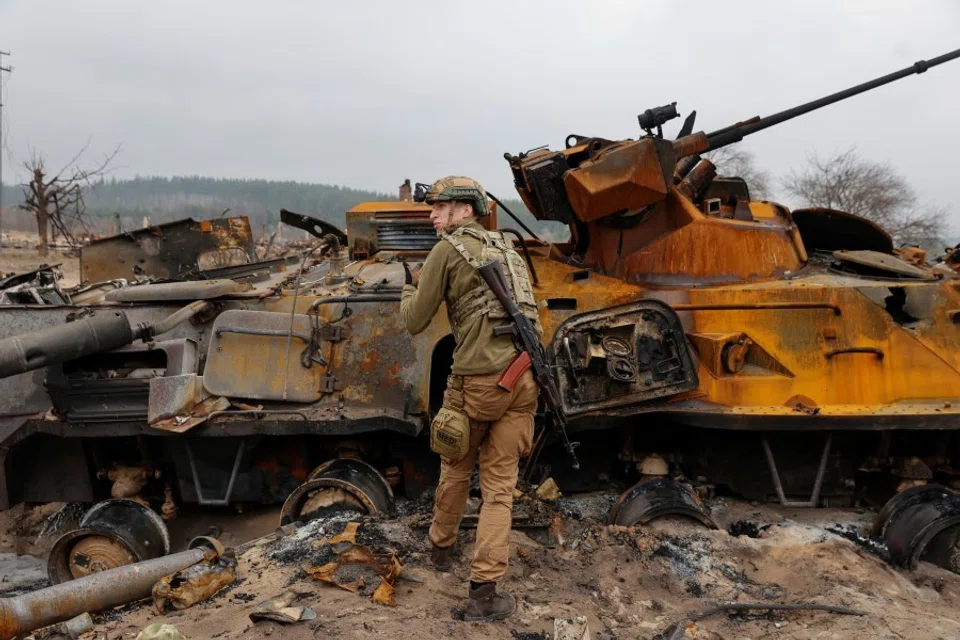
Over a month ago, the Russian Federation further violated the territorial sovereignty of Ukraine. It had already annexed Crimea in early 2014. Then after it suddenly recognised the separatist-controlled and self-proclaimed Donetsk People's Republic and Luhansk People's Republic in Eastern Ukraine on 21 February 2022, it launched a full-scale military invasion in the early hours of 24 February.
No end of fighting in sight for now
As the second month of the bloody campaign unfolds, there are no signs in sight yet that the military offensive will be suspended any time soon. Despite some optimism expressed after the latest round of Russia-Ukraine political consultations held in Istanbul, Turkey on 29 March, the Russians are continuing their offensive, albeit with some changes in their tactical and operational approaches in the conduct of war. Adding to that, questions remain about the strategic ends of Russia's aggression - will they remain unchanged or are the Kremlin's initial strategic ambitions in the process of being rethought and recalibrated?
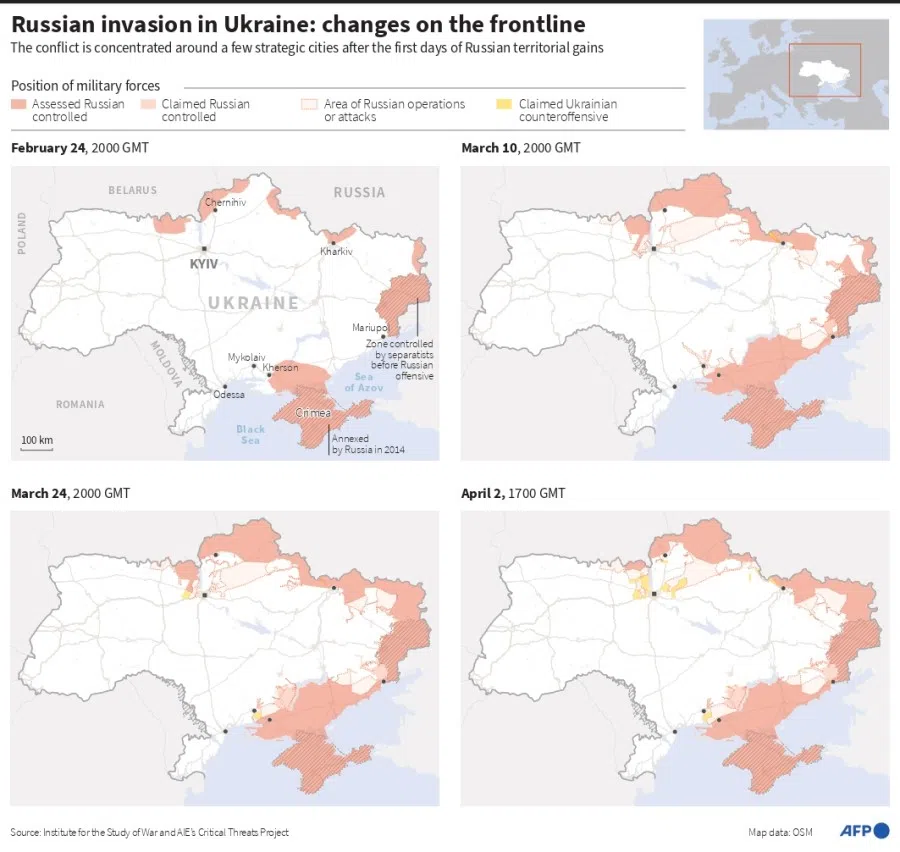
When the invasion began, Russia's President Vladimir Putin detailed three core objectives of his campaign:
Protect the then-just recognised so-called "sovereign" DPR and LPR from Ukraine's alleged military aggression and restore their territorial control within the 2014 administrative boundaries;
Demilitarise Ukraine; and
Denazify the country.
Protect the then-just recognised so-called "sovereign" DPR and LPR from Ukraine's alleged military aggression and restore their territorial control within the 2014 administrative boundaries;
Demilitarise Ukraine; and
Denazify the country.
In addition, Putin made it clear that his country had no plans to "occupy" Ukraine.
... the Russians now occupy parts of Ukrainian territory which is roughly comparable to the size of the British islands.
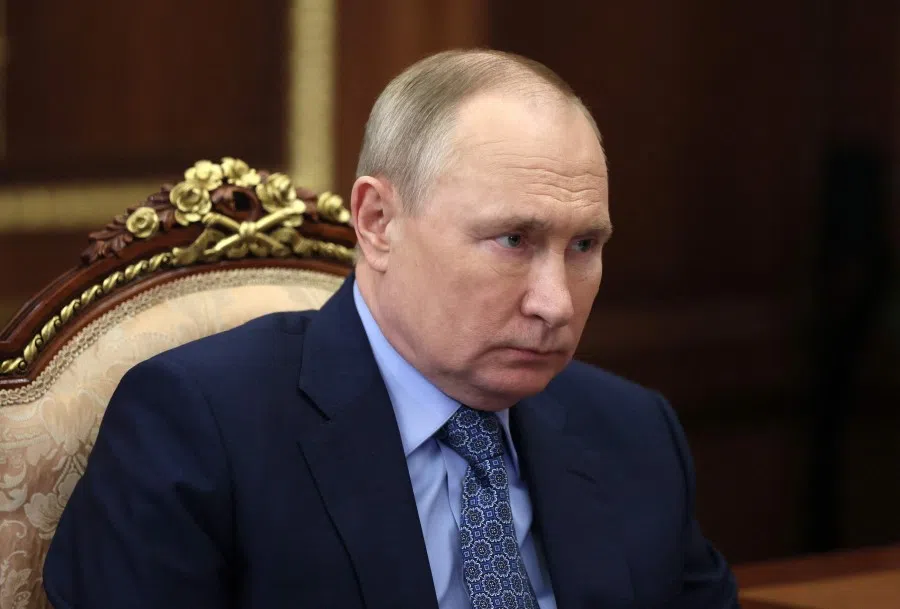
So, what did the Russians achieve after a month of intensive fighting, and what does their future strategy look like?
The most significant gains that Moscow made were in the south of Ukraine, where it established a strategically important land corridor that connects the Crimean peninsula with Russia as well as gives access to the Dnieper river, a pivotal source of much-needed fresh water to the peninsula. All in all, the Russians now occupy parts of Ukrainian territory which is roughly comparable to the size of the British islands. This is worthy of recognition but not as significant as some expectations expressed before the war that have not come to pass.
Although many analysts have focused on the surprisingly inadequate performance of the Russian offensive force, sometimes going as far as sensationally claiming that Russia has "effectively admitted defeat in Ukraine", far fewer commentators have assessed the extent of the collateral damage inflicted by the Russians on the Ukrainian military.
Even without taking into account the official Russian reporting, it is clear that despite fierce and heroic resistance, the Ukrainian military has sustained some considerable losses, particularly in air power, air defence assets and naval assets. Equally, its ground force element has been significantly weakened with the mobilisation of the majority of the adult male population, the extraordinary release of prisoners as well as the deployment of trainees and military cadets to the front line.
At this stage, it seems unlikely that Moscow will try to fully occupy the country. Rather it will focus on capturing Donbas, possibly the Mykolaiv and Odessa regions...
Should the fighting continue, Russia's next set of military priorities will be on the encirclement and destruction of the Ukrainian resistance in the Donbas region and the larger part of central Ukraine to the east of the Dnieper River. This will be combined with continuous systematic attacks against defence, command and control, and key infrastructure targets in the country's west.
Also, it is possible to expect a combined Russia-Belarus offensive against western Ukraine towards Lutsk and possibly further south with an aim to compromise land lines of military and economic supplies from the US, NATO and the EU, and to prevent Poland or other NATO member states from deploying a peacekeeping force into western and central Ukraine.
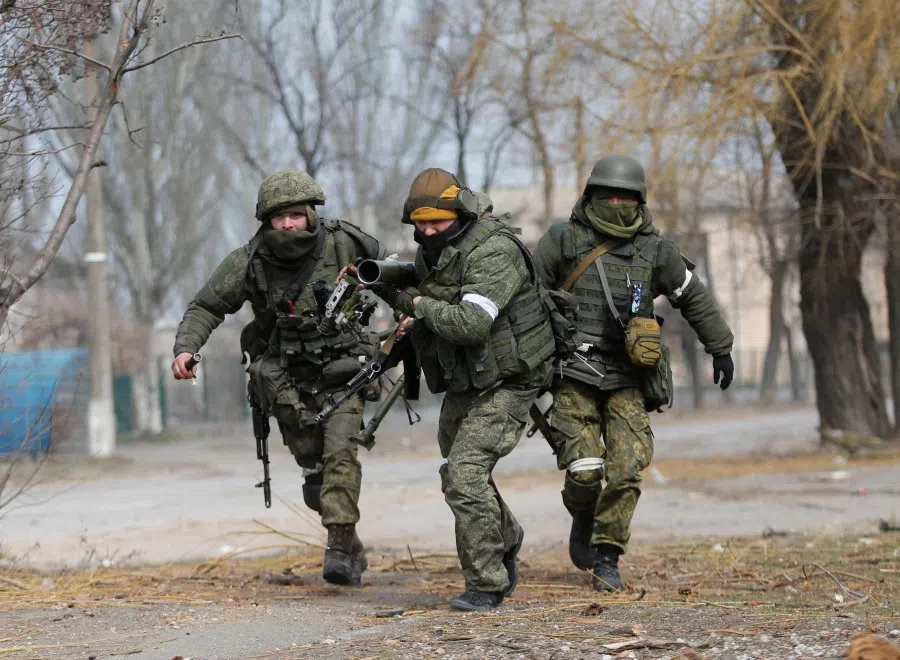
It seems that waging a war of attrition against Ukraine, though very costly, may nonetheless be advantageous to Russia, at least for now. Still, the Kremlin is desperate to find new strategies which would allow it to end the war sooner than later, and without Russia losing more political credibility. At this stage, it seems unlikely that Moscow will try to fully occupy the country. Rather it will focus on capturing Donbas, possibly the Mykolaiv and Odessa regions, followed by negotiating as much political dividends for itself as possible during the bilateral discussions with Kyiv.
But Russia's main strategic objective - transforming Ukraine into a neutral buffer - remains a top priority, meaning that it will try to affect the outcome of the political dialogue by military successes on the battlefield, or by inflicting more collateral damage on Ukraine's ability to resist.
Implications for the Indo-Pacific
Even though the war in Ukraine remains a geographically remote hotspot to the Indo-Pacific region, its economic, political and security implications are relevant to the region.
Economically, some shocks are being felt. For example, the war has already impacted regional fuel prices. Adding to that, the price hikes of some core agricultural produce could inflict additional pain on regional countries such as Indonesia, which imports 25% of its grain from Russia and Ukraine, as mentioned in a Lowy Institute report. Finally, the collateral damage inflicted by Russia on Ukraine's defence industry may see Kyiv's niche presence in the Indo-Pacific defence exports market being weakened or even lost completely.
In the absence of a similar scale US-led regional structure in the Indo-Pacific, there is now an even stronger push to make AUKUS... an effective organisational arrangement.
With respect to political and security implications, Asian states have had mixed reactions towards Russia's aggression. Contrary to the US European allies, which became united in the face of Moscow's aggressive behaviour, the region's range of views are best described in the article "We are on Our Side" in the Japan Times.
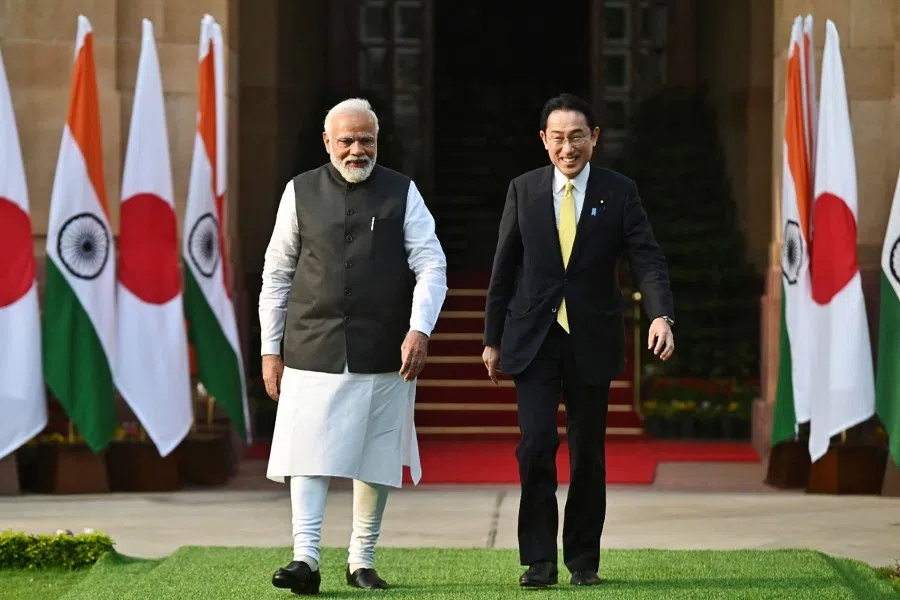
Accordingly, regional security structures have had different responses. For example, India's refusal to condemn Russia's actions prevented a united and coordinated response from the Quad group, thus highlighting the challenges of forming effective multinational security and defence structures in the Indo-Pacific.
However, the Russia-Ukraine war has once again called for the need to rethink the notion of collective defence, which represents the backbone of functioning alliances such as NATO. In the absence of a similar scale US-led regional structure in the Indo-Pacific, there is now an even stronger push to make AUKUS, the Anglo-Saxon security and defence pact between Australia, the UK and the US, an effective organisational arrangement.
Lessons from Ukraine war may provoke Beijing to act
This becomes even more timely now, because of growing concerns of China's future expansionist strategy in the region, especially vis-à-vis high-value contested areas such as Taiwan and the South China Sea. Although there are expectations that Russia's problems in Ukraine may deter China from launching an offensive against Taiwan in the near future, some core lessons from Russia's standoff with the West over Ukraine may actually provoke Beijing to act.
China is studying Russia's Ukraine playbook carefully, its successes and failures, whilst publicly highlighting that there are "no limits" in its cooperation with Moscow...
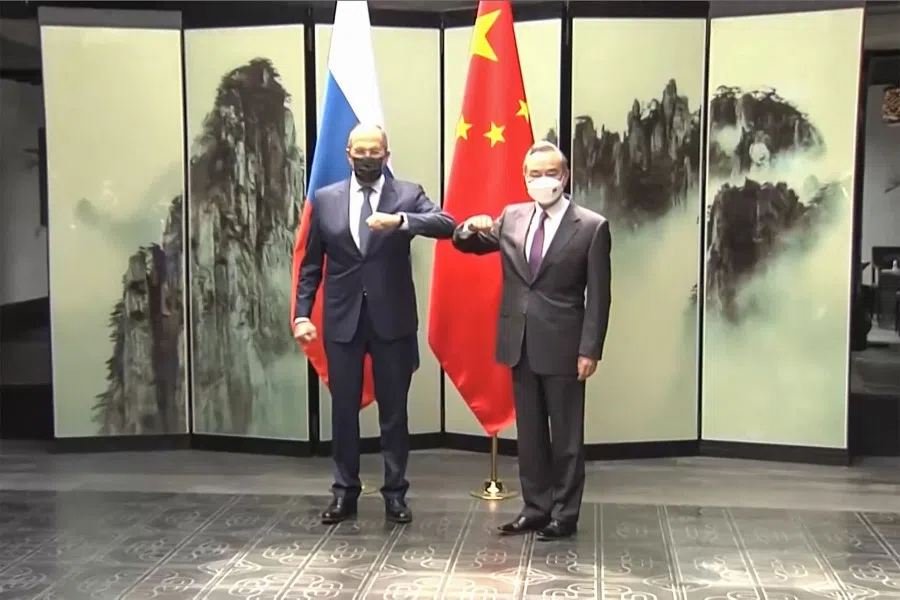
One of the key potential trigger points could be the US and NATO's refusal to challenge Russia militarily over Ukraine in fear of a nuclear retaliation. Although, contrary to Ukraine's situation, the US has said that their defence relationship with Taiwan is governed by the Taiwan Relations Act, doubts remain as to the limits of this and whether Washington will honour it if it faces a military challenge from a nuclear-armed China. But for now, China is studying Russia's Ukraine playbook carefully, its successes and failures, whilst publicly highlighting that there are "no limits" in its cooperation with Moscow as it was highlighted once again during the latest meeting between Chinese and Russian foreign ministers, which was held on 30 March.
Russia's victory in Ukraine would mean a strategic defeat for the US and its allies, potentially empowering China to make its move in East Asia.
China's continued stance of standing shoulder to shoulder with Russia on the war in Ukraine is understandable. Beijing became Moscow's trump card prior to the war. Russia's aggression against Ukraine is a de facto declaration of a values-based war by autocratic regimes against the liberal West and the international rules-based order. Russia's victory in Ukraine would mean a strategic defeat for the US and its allies, potentially empowering China to make its move in East Asia. Moscow's loss in the war would leave Beijing alone against a united West, thus increasing chances of China's strategic defeat in the longer run.
That means that the fight for Ukraine is also the struggle for future security, stability and peace in the Indo-Pacific.
Related: Lessons from Ukraine: Russia might fall into decline by going against global sentiment | Did China miscalculate the Ukraine war? | Lessons from Ukraine: Is it time to give up strategic ambiguity in the Taiwan Strait? | Will China be emboldened by Russia's invasion of Ukraine? | Ukraine war: Southeast Asian responses and why the conflict matters to the region | Why ASEAN must stand firm against Russia's invasion of Ukraine | On the wrong side of geography: Why is India tolerating Putin's Ukraine gambit?





